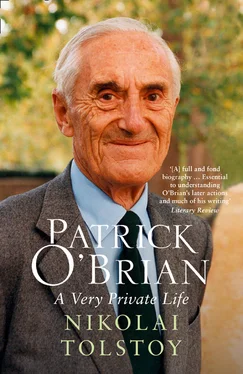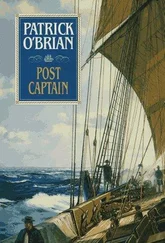In November 1951 Patrick sent off his collection, provisionally entitled Samphire and Other Stories :
I have just posted the MS to Curtis Brown: yesterday I sent six stories to the New Yorker and one, with two poems, to Irish Writing.[fn2] That they may prosper. The postage was very expensive: I did not think about Spain [for cheap postage] until this morning. But even so I do not think I would have posted them from there; they are too precious, and I want to hear soon. After re-reading and re-typing both, I am fairly sure that Samphire is much better than The Lemon: not so clever, much more concentrated (the Lemon tries to say too much and grows diffuse) and because of the hatred in it, more lovingly handled. So I have called the book Samphire and put that story first. It was a slimmer parcel than usual, but it is between 60 and 65 thousand … I feel rather low now, with the typewriter folded up and the MS gone: I regret my hurry; I could have polished more.
Sadly, disappointment swiftly followed. A month later Fred Warburg wrote to Curtis Brown:
I have now had a report on the new stories of Patrick O’Brian, SAMPHIRE, and some of them are good, though others seem to us basically to fail. However I think it is absolutely essential that we publish the novel now called THREE BEAR WITNESS instead of TESTIMONIES and see if we can do well with it before committing ourselves to further work from O’Brian particularly in the short story field.
Eventually most of the stories were published in book form, although not for some years. It was an eclectic selection that Patrick had despatched. ‘Samphire’, on which he particularly prided himself, is simply summarized. A young couple is walking beside a seacliff: he complacent, insensitive, and possessed of a tiresomely adolescent sense of humour; she a quiet, nervous, sensitive girl, whose nerves are stretched to breaking point by her husband’s relentlessly patronizing jocularity. When he stretches down to pick a sprig of samphire, she suddenly loses self-control and vainly attempts to push him over the edge. Even the insensitive soul to whom she is married recognizes with shock the impassable gulf suddenly opened between them, and realizes that nothing will ever be the same again.
In 1985, Patrick explained to the publisher Bell and Hyman how he came to write the story:
I was reflecting … as I walked along the cliffs that overhang the sea near our house [at Collioure], and a striking example occurred to me – that of a particularly elegant, intelligent woman who in her extreme and utterly inexperienced youth had married a bore or, at least a man who had developed into a bore, a didactic eternally prating bore. At some point in my walk I noticed some plants growing quite far down on the rock face: the lines about the samphire-gatherer in King Lear drifted into my mind, & as I walked on in a vague, uneasy state of the two notions combined and this took form without any conscious effort on my part.
This account is not entirely candid. The story makes uneasy reading for me, since the husband is unmistakably a recognizable, if uncharitable, portrait of my father, and the delicate young wife my mother, who was eighteen when they married. It was lingering guilt, I suspect, that impelled Patrick to write a story stressing that the marriage was doomed from the outset, regardless of intervention by any third party.
The extent to which Patrick at this experimental stage of his literary career utilized his fiction as an instrument of attack or defence in relation to aspects of his own life is exemplified by two other stories in the collection. In the first, ‘The Flower Pot’, a couple of Germans, living in what is manifestly Collioure, lovingly tend six flower pots on their windowsill. A fierce tramontane blows up, an increasing gale tearing through the streets: one of the pots is dislodged, and kills a fisherman below. The man responsible is filled with horror:
A man struck dead, or maimed for ever: struck down and by his fault. The great wave of hatred rising from the street. The foreigners at René’s have killed père Matthieu. The pointing and the great just wave of hate; and his head only, peering from the window, peering down to meet the hatred and the pointing.
One might imagine this gloomy little tale arose from a flight of fancy, but for this notice in my mother’s diary for St Patrick’s Day 1951:
P. finished the Flower Pot yesterday … after we had been on the jetty. There was a fantastic dry warm wind three days ago which knocked the pinks off bedroom window-sill. It landed just beside M. Ribeille, who only laughed. We felt terribly guilty & P. has fastened all the pots with wire.
Their dismay was understandable, but Patrick’s emphasis on the great wave of collective hatred arising against the hapless outsider plainly reflects his continuing sense of isolated insecurity, originating in the damaging circumstances of his solitary childhood.
Another tale illustrates Patrick’s propensity, at least in the early days of his literary career, to deploy his fiction as a weapon of psychic attack. ‘The Lemon’ concerns a man whose isolated existence has transformed him into a psychopath. The first part of the story comprises an arresting analysis of his bewildering condition, and its symptoms. Despite this, he is on good terms with his neighbours, who are:
working people, kind, sensible, very tolerant. Good people, my neighbours: all except the man and woman who kept the restaurant on the ground floor. They were a bad couple; the man a flashy, smarmy-haired little pompous rat; the woman a short-legged, hard-faced shrew of about forty … They drank heavily, quarrelled and screamed until dawn sometimes. Their place was frequented by their friends and by foreigners on the spree, and they bawled and sang and shrieked above the blaring wireless until four or five in the morning.
A sluttish waitress, ceaselessly singing loudly and tunelessly during the day, by night slept indiscriminately with the clientèle.
The restaurant in question is unmistakably Le Puits, which occupied the ground floor of the house in the rue Arago, two storeys below the flat in which Patrick and my mother lived. On 19 February my mother wearily recorded: ‘The Puits kept it up until 6 a.m.: an infernal racket.’ On 27 May Patrick stayed up most of the night writing ‘The Lemon’. In the story he (for I fear the nameless protagonist is he) creeps downstairs, removes the fuse controlling the lighting for the restaurant, and hurls a hand grenade (‘the lemon’) into the darkness. As he carefully restores the fuse and tiptoes back up to his apartement , a blinding flash and shattering roar proclaim the destruction of the entire crew of revellers in Le Puits. Ah, if only …[fn3]
Of the thirty-three stories Patrick wrote during the year 1950–51, nine were never published. Of these, three (‘Federico’, ‘Moses Henry’ and ‘Fort Carré’) appear to be lost. The manuscripts of the remaining six are in my possession, and make interesting reading. ‘Mrs Disher’ concerns an old man’s confused reflections on his dying housekeeper, while ‘The Clerk’ explores a disturbing memory of medieval antisemitism encountered in a remote English town by a visiting enthusiast for church architecture.
‘George’ (which he retitled ‘The Tubercular Wonder’) is the most revealing of these unpublished tales in respect of Patrick’s own life. In the first volume of this biography, I suggested that it provides an illuminating exposé of his troubled state of mind at the time he began his secret affair with my mother, betraying an overriding sense of guilt in respect of his betrayed wife Elizabeth.[2] The theme of another story, ‘Beef Tea’, recalls that of ‘Samphire’, with its dull and relentlessly facetious husband, who drives his long-suffering wife to insanity. It looks like a further attempt to dismiss the reproachful figure of my father, representing him as utterly impossible to live with.
Читать дальше












